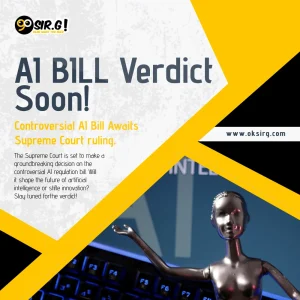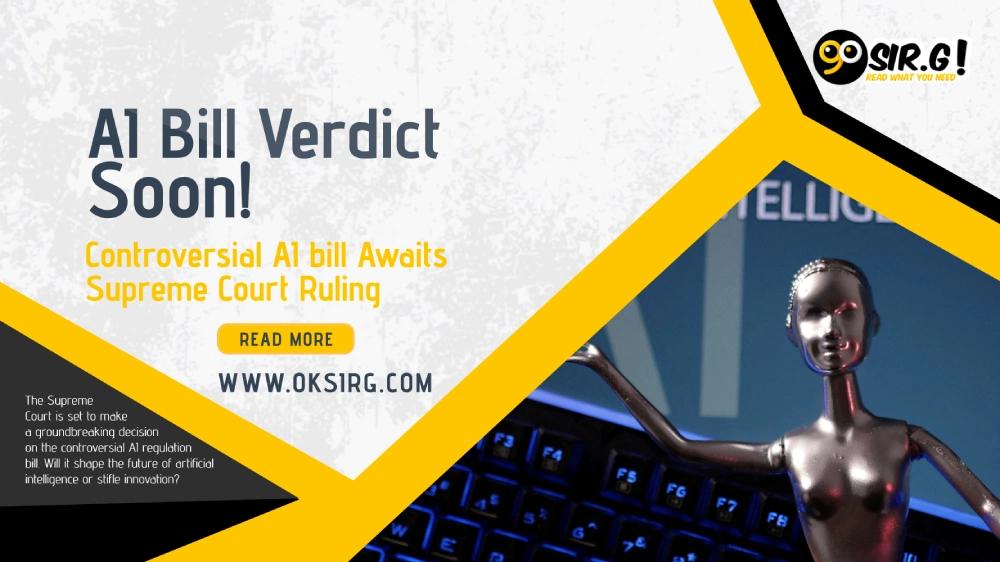This will, therefore, call for rapid technological changes to be regulated correctly. A widely debated AI regulation bill is waiting for a ruling by the Supreme Court, whose judgment is to be pronounced next month. This will have much to say about how technological progress can shape or disrupt future societal trends. As a proponent of responsible AI development, it is naturally an inevitable component of the broader debate that will unfold in our lives as we discuss technology regulations.
Growing Demand for Tech Regulation in the AI Atmosphere
The more we try to integrate AI in every walk of life, be it health or transportation, the more indispensable tech regulation has become. Then, the risks will be unlimited because the benefits from AI will be limitless. Challenges through privacy, security, and ethical considerations may arise without proper regulation of AI. The Supreme Court’s decision will soon set an example.
All regulation on technology-related issues must form their core accountability and transparency. We live in an age where algorithms determine the outcom es of decisions, and the flip side is that people may have to live with that consequence. How these systems work must be known. This is mainly because people use more facial recognition technology, which allows biases to feed into the automated systems. Thus, fairness and nondiscrimination should be critical principles in creating AI tech regulation frameworks that ensure public trust in such technologies.
es of decisions, and the flip side is that people may have to live with that consequence. How these systems work must be known. This is mainly because people use more facial recognition technology, which allows biases to feed into the automated systems. Thus, fairness and nondiscrimination should be critical principles in creating AI tech regulation frameworks that ensure public trust in such technologies.
Understanding The Most Vital Components Of AI Legislation
Some constituents of the government bill on the regulation of AI exist. These include guidelines for both developers and AI users. The constituent can be regarded as the most vital one since the proper deployment of AI technologies will be ensured, thereby creating a safer space through standard human rights, privacy, and accountability principles.
These monitoring and regulatory mechanisms are proposed so all persons adhere to the set standards. One can be optimistic about the effects of such legislation on the possibilities. If it is done rightly, then such legislation may create the space for a balanced approach toward AI development and spur innovation in AI by protecting public interests.
Laws On Artificial Intelligence Around The World
Already, many countries globally have enacted their AI legislation. Europe views AI as a current challenge and is ahead in how closely it is working towards defining comprehensive legal definitions to counter issues relating to ethical, privacy, and safety concerns. Indeed, what could learned from around the world about handling such themes before implementing AI laws in the United States would crucial.
An international perspective has required in the making of laws on artificial intelligence because technology has global in nature. And whatever may take place somewhere else significantly affects its very nature or content. International cooperation brings best practices. And a joined-up framework to approach AI’s benefits and challenges.
The Role Of Public Opinion In AI Regulation / Tech Regulation!
Public opinion makes the AI regulations thinkable and finally sends the issue to the Supreme Court for its ultimate verdict. On the other hand, the majority of the population is significantly concerned by AI’s implications for their jobs, privileges, and decision-making. We cannot undermine that; we will produce our opinions. And raise our voices to ensure our values are part of AI’s regulations.
Absolutes will be the participation of citizens in policymaking and legislating on ethical issues and, above all, public welfare. That is the process by which the ruling dictates when the citizens can voice their opinions regarding what direction the AI regulation should take. And what means it can influence our lives significantly.
Future Of Regulations On AI: What To Expect
Let’s take it back and forth, relating this to my thoughts on the Supreme Court verdict. Let me confess a mix of excitement and anxiety over such a verdict. A blend of excitement and anxiety would mean drastic shifts in AI technologies if the court upholds the bill. As witnessed in their development and deployment. But suppose the court throws the bill out. The consequence would be a massive vacuum in the regulations on AI and possibly. Confrontation with a fractured approach toward AI as things go slower and dubious practice flourishes.
Considering all these, I call upon all the stakeholders, developers, and lawmakers to come together to build a collaborative method. This can harmonized between the design of regulatory frameworks to spur innovation and the protection of public interest. Multidomain inputs of technology, ethics, and law are thus necessary for creating a balanced. All-around approach that better regulates AI.
Conclusion: Responsible AI Development / Tech Regulation!
It is pertinent to mention that the Supreme Court is about to pronounce its judgment over a much-talked-about AI regulation bill. It will mark a momentous shift in our society’s social scenario of artificial intelligence. In this crucible moment, I appeal to all of us to welcome responsible AI development: ethics and transparency should come first. The list afterwards should be public welfare. Well-aware regulation of AI’s intricacies can give its fullest fruition without letting its risks occur.
This was not a judgment about the laws of artificial intelligence. But about our values as a society before such high rates of technological advancement. We must continue fighting for the regulation of AI. It would show that we stand not only. As a united front in our pursuit of a just future but also as champions of justice and equality.









Leave feedback about this
You must be logged in to post a comment.